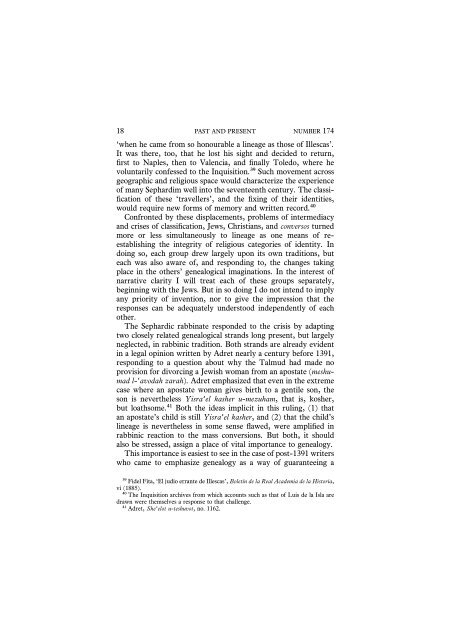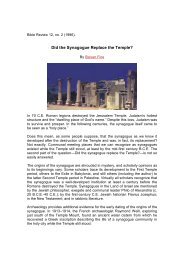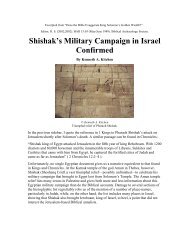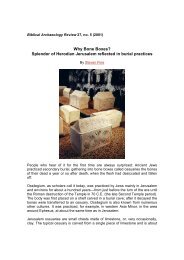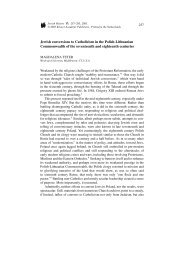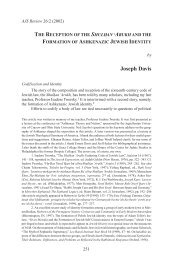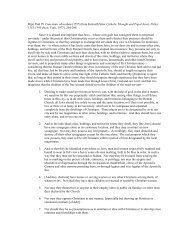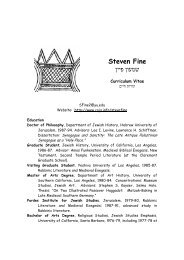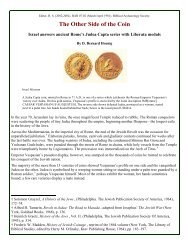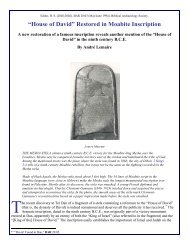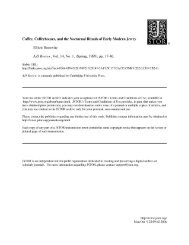jews and christians in fifteenth-century spain
jews and christians in fifteenth-century spain
jews and christians in fifteenth-century spain
Create successful ePaper yourself
Turn your PDF publications into a flip-book with our unique Google optimized e-Paper software.
18 PAST AND PRESENT NUMBER 174<br />
‘when he came from so honourable a l<strong>in</strong>eage as those of Illescas’.<br />
It was there, too, that he lost his sight <strong>and</strong> decided to return,<br />
first to Naples, then to Valencia, <strong>and</strong> f<strong>in</strong>ally Toledo, where he<br />
voluntarily confessed to the Inquisition.39 Such movement across<br />
geographic <strong>and</strong> religious space would characterize the experience<br />
of many Sephardim well <strong>in</strong>to the seventeenth <strong>century</strong>. The classification<br />
of these ‘travellers’, <strong>and</strong> the fix<strong>in</strong>g of their identities,<br />
would require new forms of memory <strong>and</strong> written record.40<br />
Confronted by these displacements, problems of <strong>in</strong>termediacy<br />
<strong>and</strong> crises of classification, Jews, Christians, <strong>and</strong> conversos turned<br />
more or less simultaneously to l<strong>in</strong>eage as one means of reestablish<strong>in</strong>g<br />
the <strong>in</strong>tegrity of religious categories of identity. In<br />
do<strong>in</strong>g so, each group drew largely upon its own traditions, but<br />
each was also aware of, <strong>and</strong> respond<strong>in</strong>g to, the changes tak<strong>in</strong>g<br />
place <strong>in</strong> the others’ genealogical imag<strong>in</strong>ations. In the <strong>in</strong>terest of<br />
narrative clarity I will treat each of these groups separately,<br />
beg<strong>in</strong>n<strong>in</strong>g with the Jews. But <strong>in</strong> so do<strong>in</strong>g I do not <strong>in</strong>tend to imply<br />
any priority of <strong>in</strong>vention, nor to give the impression that the<br />
responses can be adequately understood <strong>in</strong>dependently of each<br />
other.<br />
The Sephardic rabb<strong>in</strong>ate responded to the crisis by adapt<strong>in</strong>g<br />
two closely related genealogical str<strong>and</strong>s long present, but largely<br />
neglected, <strong>in</strong> rabb<strong>in</strong>ic tradition. Both str<strong>and</strong>s are already evident<br />
<strong>in</strong> a legal op<strong>in</strong>ion written by Adret nearly a <strong>century</strong> before 1391,<br />
respond<strong>in</strong>g to a question about why the Talmud had made no<br />
provision for divorc<strong>in</strong>g a Jewish woman from an apostate (meshumad<br />
l-[avodah zarah). Adret emphasized that even <strong>in</strong> the extreme<br />
case where an apostate woman gives birth to a gentile son, the<br />
son is nevertheless Yisra]el kasher u-mezuham, that is, kosher,<br />
but loathsome.41 Both the ideas implicit <strong>in</strong> this rul<strong>in</strong>g, (1) that<br />
an apostate’s child is still Yisra]el kasher, <strong>and</strong> (2) that the child’s<br />
l<strong>in</strong>eage is nevertheless <strong>in</strong> some sense flawed, were amplified <strong>in</strong><br />
rabb<strong>in</strong>ic reaction to the mass conversions. But both, it should<br />
also be stressed, assign a place of vital importance to genealogy.<br />
This importance is easiest to see <strong>in</strong> the case of post-1391 writers<br />
who came to emphasize genealogy as a way of guarantee<strong>in</strong>g a<br />
39 Fidel Fita, ‘El judío errante de Illescas’, Boletín de la Real Academia de la Historia,<br />
vi (1885).<br />
40 The Inquisition archives from which accounts such as that of Luis de la Isla are<br />
drawn were themselves a response to that challenge.<br />
41 Adret, She]elot u-teshuvot, no. 1162.


